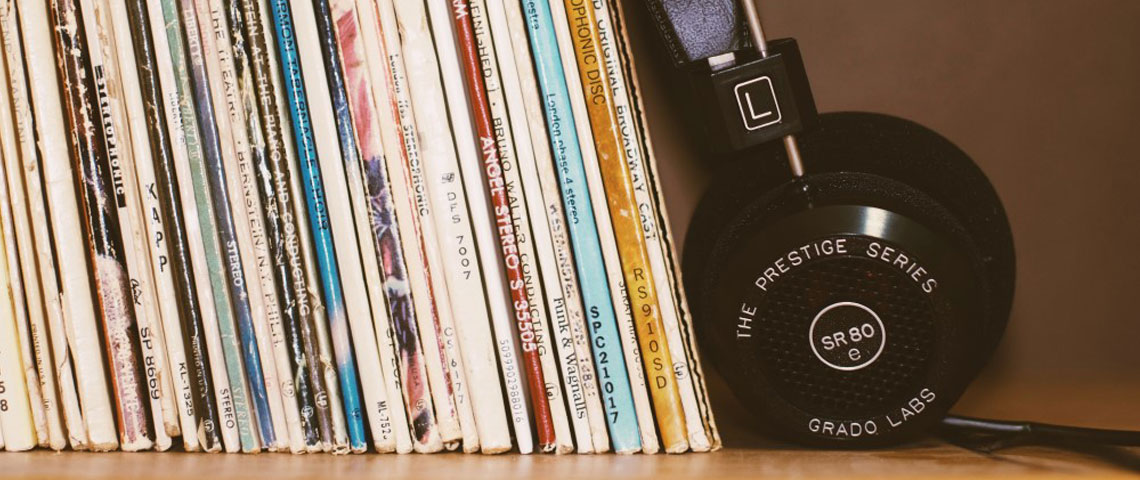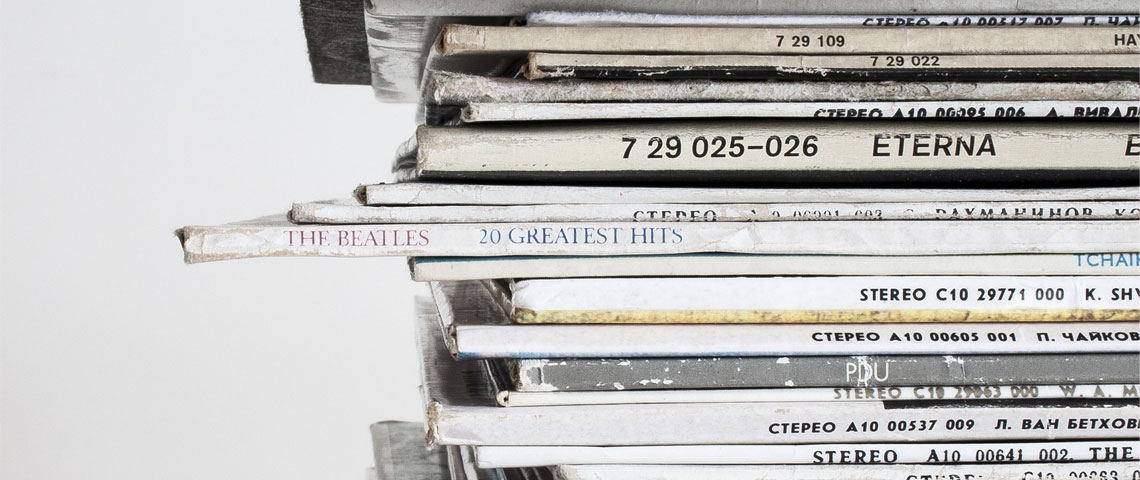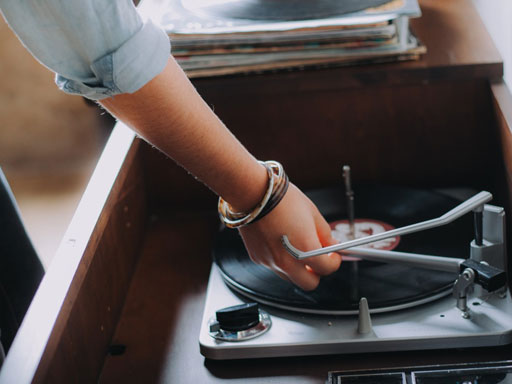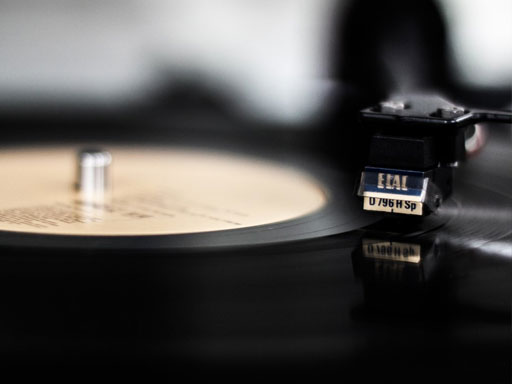Your vinyl collection likely ranks as one of the most precious of your possessions, so it's important to take good care of it while you're moving or otherwise in transition. Here are our top tips for safe vinyl record storage.
Nothing adds retro warmth and good vibes to a party or an evening in like the comforting scratch of vinyl. With a record on in the background, from classical jazz to alternative rock, all feels cosy and right with the world.
Until you hear that first scriiiiiiiiiiiiiiiiittttch of the needle against damaged vinyl, that is. If you want to avoid such a sorry outcome, it's important to care for records with the utmost safety and security.
That's where smart vinyl record storage comes in. Whether you're moving across the country or simply undergoing a home renovation, it is important to provide proper care for your vinyl while it's on standby. That way, when you're ready to display and play that beautiful collection again, it's there waiting for you.
How to Care for Records in Everyday Use
Both vinyl neophytes and old pros probably already know that vinyl requires special handling. Like a photograph, you should only hold a record at its edges, and you should take precautions during playing records to keep it in good shape. That includes:
- Cutting the record properly to ensure the needle drops down gently and the song starts where you want it to
- Waiting until it has stopped moving completely before picking it back up
- Putting it back when you're through with it
In addition to proper everyday use, you must also consider taking the right approach when storing records. Toronto's cold, wet winters and humid summers can wreak havoc on delicate cardboard jackets and even the vinyl itself. For that reason, it's strongly recommended that you store your vinyl collection in a climate-controlled location.
It's not enough to just simply toss your vinyl in towering stacks with a roof over their head, however. You'll need a system.
Steps for Safe and Secure Vinyl Record Storage
Nothing ruins the sound of Celine Dion's dulcet tones or Gordon Lightfoot's wooing lyrics like a scratch, but unfortunately, many vinyl owners set themselves up for failure from the start.
They stack records incorrectly, leading to warping and breakage. They store them in exposed conditions, which causes moisture damage and mould. They treat the dust jackets carelessly, eroding those pretty covers and lessening the protection they afford.
Whether you collect for investment purposes or simply love your records, you want to avoid such outcomes. Luckily, there exist proper vinyl record storage techniques you need to know about. Here they are.
Clean Records Before Storing Them
Cleaning will prepare both vinyl and the outermost cardboard jackets for short- or long-term storage, giving dust and mould less to stick to. Otherwise, if you leave grime and oils on the surface of a record, you're just asking for more gunk to accumulate.
For records, first brush them using a vinyl record brush, moving in a circular motion with the grooves. Then use a record cleaning spray and a soft cloth to wipe it clean, again using circular movements. Cleaning kits contain all of the above for easy maintenance.
Before you place the record back in its sleeve, inspect it to make sure that it's still in good shape. Use regular home surface wipes to maintain the cardboard jackets, then dry them with a clean cloth. If you face a particularly stubborn stain, use Goo Gone, then wipe the residue quickly, as it's pretty oily. Place the record in the protective sleeve. If the record jacket is damaged, you'll want to make efforts to repair that as well.
Repair Damaged Record Jackets
The vinyl jackets do more than look pretty; they protect the vinyl from the challenges posed by temperature, humidity and handling. Therefore, proper vinyl record storage starts with sturdy, well-maintained jackets.
If yours are in sad shape, take some time to repair all your jackets. This is easier than you think; it's possible to fix all sorts of splits and tears without ugly packing tape, so check out this tutorial. You'll be surprised by the pro results!
Never Stack Records Vertically

Stacking is key to vinyl record storage. It's easy to generalize from CD cases, which have a great deal of structural integrity and can withstand being stacked 20 high, but that's not the case with vinyl.
Remember, record jackets are made of cardboard, and therefore they aren't that supportive. If you store records vertically, you place weight on the bottom records, which can lead to warping or cracking. Good vinyl record storage requires a system for keeping records stacked horizontally, side by side in an upright fashion. You can:
- Get a shelf for your vinyl and place records side-by-side
- Store your records in clean, dry boxes, again ensuring that they're arranged in horizontal rows
- Buy special vinyl records storage cases, which you can find online or at an area department store
Don't Share Your Storage Unit

If you're planning on storing your vinyl collection in a storage unit, remember this: Don't share your storage unit.
When you share storage, you give up a great deal of control about conditions and security. You never really know what others are storing, so you can't guarantee they won't accidentally abuse your collection. For instance, by bringing in smelly, mouldy or toxic items, your unit-mate could unintentionally cause warping, cracking or moulding. Even if their intentions were harmless, the results might not be.
Plus, when you share, you make it more likely for your items to get nabbed. Perhaps your storage mate doesn't lock the unit correctly or brings an untrustworthy friend with them. Also, misunderstandings do occur. Once possessions have cohabitated for a while, lines blur. What was once clearly yours might not be after a year or two.
Don't let that happen to you. Maintain your storage unit as your own, and you'll keep both possessions and friendships safe.
Keep Vinyl Records Safe with the Right Storage Unit
The above tips apply to all record storage, whether in your garage or home, attic or even your man cave. But it's especially important to prepare vinyl for storage if you're going to leave your collection in a unit, such as while living far away or renovating your home.
That's where climate-controlled storage comes in. It is critical you don't just leave your records in any old unit. Without climate control, your records can get cold and brittle — prone to breakage. Or they can get so hot you can literally roll them like a pancake. Ce n'est pas bon.
Instead, opt for local climate-controlled storage. That way, you can beat the summer heat and the bitter winter cold at the same time. Then, check on your goods whenever you need to during your reno or when you come back to town. As long as you use the tips above, your vinyl will stay safe for years, with minor maintenance, or even decades.























